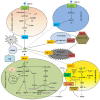Proton-coupled monocarboxylate transporters in cancer: From metabolic crosstalk, immunosuppression and anti-apoptosis to clinical applications
- PMID: 36506099
- PMCID: PMC9727313
- DOI: 10.3389/fcell.2022.1069555
Proton-coupled monocarboxylate transporters in cancer: From metabolic crosstalk, immunosuppression and anti-apoptosis to clinical applications
Abstract
The Warburg effect is known as the hyperactive glycolysis that provides the energy needed for rapid growth and proliferation in most tumor cells even under the condition of sufficient oxygen. This metabolic pattern can lead to a large accumulation of lactic acid and intracellular acidification, which can affect the growth of tumor cells and lead to cell death. Proton-coupled monocarboxylate transporters (MCTs) belong to the SLC16A gene family, which consists of 14 members. MCT1-4 promotes the passive transport of monocarboxylate (e.g., lactate, pyruvate, and ketone bodies) and proton transport across membranes. MCT1-4-mediated lactate shuttling between glycolytic tumor cells or cancer-associated fibroblasts and oxidative tumor cells plays an important role in the metabolic reprogramming of energy, lipids, and amino acids and maintains the survival of tumor cells. In addition, MCT-mediated lactate signaling can promote tumor angiogenesis, immune suppression and multidrug resistance, migration and metastasis, and ferroptosis resistance and autophagy, which is conducive to the development of tumor cells and avoid death. Although there are certain challenges, the study of targeted drugs against these transporters shows great promise and may form new anticancer treatment options.
Keywords: MCT inhibitors; angiogenesis; autophagy; lactate; metastasis; monocarboxylate transporters; tumor metabolism; tumor microenvironment.
Copyright © 2022 Duan, Zhang, Wang, Lu, Sun and Wu.
Conflict of interest statement
The authors declare that the research was conducted in the absence of any commercial or financial relationships that could be construed as a potential conflict of interest.
Figures

References
-
- Alfarouk K. O., Verduzco D., Rauch C., Muddathir A. K., Adil H. H., Elhassan G. O., et al. (2014). Glycolysis, tumour metabolism, cancer growth and dissemination. A new pH-based etiopathogenic perspective and therapeutic approach to an old cancer question. Oncoscience 18, 777–802. 10.18632/oncoscience - DOI - PMC - PubMed
Publication types
LinkOut - more resources
Full Text Sources

